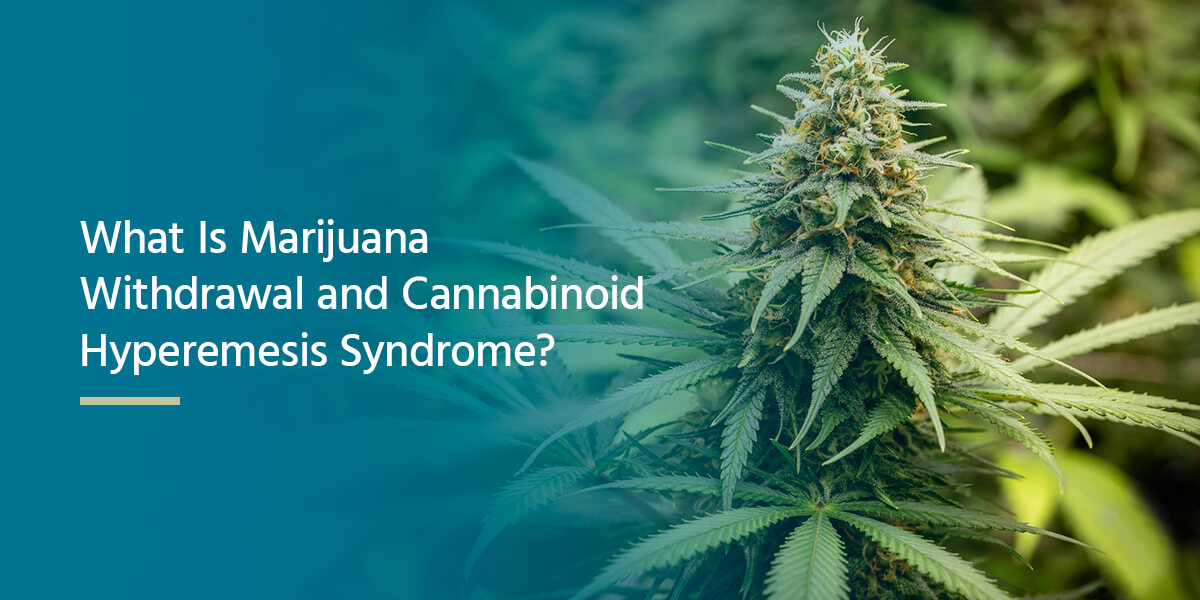Marijuana can be problematic for some people, especially when using it frequently. Continual usage can lead to physiological dependence, withdrawal syndrome and addiction.
Marijuana is the most common illicitly used drug in the U.S., and research estimates that three in 10 people who use it have marijuana use disorder. Keep reading to learn about marijuana withdrawal, cannabinoid hyperemesis syndrome and how to get help if you or a loved one is struggling.
Marijuana Withdrawal Symptoms
People who use marijuana daily or frequently for months may develop cannabis withdrawal syndrome. The symptoms of this condition will typically appear within a week after someone stops abusing marijuana.
Physical and psychological marijuana withdrawal symptoms might include:
- Anger, irritability or aggressiveness
- Extreme nervousness or anxiety
- Sleep disturbances like insomnia or nightmares
- A decrease in appetite or significant weight loss
- Mood swings
- Loss of focus
- Restlessness and general fatigue
- The onset of feelings of depression
- Abdominal pain and headache
- Fever or chills
- Sweating
- Tremors or shakiness
- Cravings for marijuana
These symptoms can range in intensity and may vary depending on the person. They may not be severe or dangerous, but they can be highly unpleasant. The longer you use marijuana, the more likely you are to experience withdrawal symptoms.
What Is CHS?
Cannabinoid hyperemesis syndrome is a condition caused by long-term marijuana use. Hyperemesis means severe vomiting. Those with CHS experience nausea, vomiting, abdominal pain, dehydration and frequent visits to the emergency room.
The cannabinoid compounds found in the marijuana plant bind to specialized receptors in your brain, immune cells and gastrointestinal tract. CHS can lead to severe health complications if left untreated. It’s essential to seek emergency services if you are experiencing CHS symptoms.
People who chronically use marijuana are at risk of developing this condition. It’s more likely to occur in those who smoke, vape or ingest cannabis at least once a week — more often in those who have been using it since young adulthood.
Experts are unsure what causes cannabis hyperemesis syndrome, though many researchers suspect genetics play a role. Others believe CHS might occur from the overstimulation of the endocannabinoid system, a network of receptors that respond to cannabis compounds in the body.
Severe Marijuana Withdrawal CHS Symptoms
Those with CHS experience persistent nausea and vomit extensively, up to five times per hour. They may also have abdominal pain and often report weight loss.
Other symptoms of CHS include:
- Anxiety
- Constipation
- Diarrhea
- Excessive thirstiness
- Sweating
- Dry mouth
Timeline of Severe Marijuana Withdrawal Symptoms
There are three phases of cannabis hyperemesis syndrome, each of which can bring about different symptoms.
- Prodromal phase: This phase is typical among adults who have used marijuana since they were teenagers. You may have abdominal pain or morning nausea but never actually vomit.
- Hyperemetic phase: The hyperemetic phase typically lasts 24 to 48 hours, causing intense and recurrent vomiting and nausea. Many people begin avoiding food at this stage.
- Recovery phase: During recovery, people stop using marijuana. In recovery, symptoms will weaken over a few days or months before eventually disappearing altogether.
It’s essential to seek medical care immediately if you have recurrent vomiting. If left untreated, this condition can lead to dehydration, malnutrition, inflammation in the esophagus or tooth decay.
Go to your nearest emergency center if you have dehydration symptoms, such as:
- Dark or very little urine
- Delirium or sudden confusion
- Fatigue or unexplained sleepiness
- Rapid breathing
- Dizziness
- Quickened heart rate
- Fainting
If you have prolonged nausea and vomiting, you may need medication or intravenous fluids to help you recover and feel better.
Does CHS Go Away?
Cannabis hyperemesis is a rare condition that typically disappears when you stop using cannabis. Many people compulsively bathe or shower to relieve symptoms, allowing the hot water to soothe their nausea. Some medications might also reduce nausea. However, the only long-term solution is to quit using marijuana altogether.
Those who frequently experience CHS might also seek professional addiction treatment to end their reliance on marijuana. These addiction therapy services provide the necessary tools for sober living.
- Individual therapy: You will work with a mental health professional to identify the underlying causes of your addiction and establish coping mechanisms and strategies to combat your triggers and reach sobriety.
- Process group therapy: In a group setting, professionals will facilitate a discussion about each person’s recovery journey. You can connect with like-minded peers, provide encouragement and learn how to stay sober and healthy.
- Wilderness therapy: Spending time in nature can help you escape the toxic roots of your addiction. Nature and greenery can often provide peace and foster reflection and healing for those struggling with substance use disorder.
Is Marijuana Addictive?
The DSM-5-TR lists marijuana as an addictive drug. The National Institute on Drug Abuse also identifies it as a drug with the potential for problematic use, or marijuana addiction, in severe cases.
The DSM-5-TR states people who regularly use marijuana might display similar symptoms and behaviors observed with other forms of addiction. Those who develop cannabis use disorder exhibit impaired control, risky behavior, social impairment, or physiological adaptation. Others may not become dependent on marijuana but struggle with cocaine, alcohol or opioid addiction.
Cannabis can also cause dependence and withdrawal. Withdrawal occurs when the brain cannot achieve equilibrium without a drug. Most people experience uncomfortable symptoms until their brains fully readjust.
Get Marijuana Addiction Treatment at Crest View Recovery Center
Deciding to end your relationship with marijuana is a courageous and positive step in the right direction. You should know you are never alone in your recovery. Addiction treatment centers can help you safely and effectively reach sobriety and improve your overall health and well-being.
At Crest View Recovery Center, we aim to foster an environment of hope and compassion while initiating change. Our addiction education, individualized treatment and holistic approaches can help you heal physically, spiritually and emotionally. We’ll work with you wherever you are in your journey and help you get the most out of treatment.
To learn more about our addiction treatment programs, contact us today.





